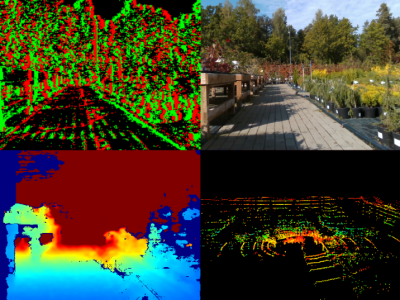mp4
A new generation of computer vision, namely event-based or neuromorphic vision, provides a new paradigm for capturing visual data and the way such data is processed. Event-based vision is a state-of-art technology of robot vision. It is particularly promising for use in both mobile robots and drones for visual navigation tasks. Due to a highly novel type of visual sensors used in event-based vision, only a few datasets aimed at visual navigation tasks are publicly available.
- Categories:
 1207 Views
1207 ViewsA new generation of computer vision, namely event-based or neuromorphic vision, provides a new paradigm for capturing visual data and the way such data is processed. Event-based vision is a state-of-art technology of robot vision. It is particularly promising for use in both mobile robots and drones for visual navigation tasks. Due to a highly novel type of visual sensors used in event-based vision, only a few datasets aimed at visual navigation tasks are publicly available.
- Categories:
 1372 Views
1372 Views
This study presents an overview of AiDIN-VI, a force-controllable quadruped robot system that is incorporated the mandatory abilities: speed, efficiency, and mobility to provide real-world services.
The paper describes design methodologies and principles for implementing the requisite capabilities in a single robot platform, and in particular, the torque sensing method, components, and modularization method of the torque-controllable actuator unit.
- Categories:
 295 Views
295 ViewsThis dataset provides digital images and videos of surface ice conditions were collected from two Alberta rivers - North Saskatchewan River and Peace River - in the 2016-2017 winter seasons.
Images from North Saskatchewan River were collected using both Reconyx PC800 Hyperfire Professional game cameras mounted on two bridges in Edmonton as well as a Blade Chroma UAV equipped with a CGO3 4K camera at the Genesee boat launch.
Data for the Peace River was collected using only the UAV at the Dunvegan Bridge boat launch and Shaftesbury Ferry crossing.
- Categories:
 1463 Views
1463 Views
Video dataset of 102 participants for the paper "Learning deep representations for video-based intake gesture detection"
- Categories:
 117 Views
117 Views
These videos show bottom and side views of the treatment by a He/O2 plasma jet of a solution containing ultra-pure water, potassium iodide and starch. As the plasma reaches the liquid, a purple filament characteristic of the triiodide ion/starch complex appears. This complex is formed by the reaction between iodide ion and a reactive oxygen and nitrogen species (RONS) such as ozone, hydrogen peroxide, hydroxide ion, nitric oxyde or nitrate. Therefore, the formation of these RONS in the liquid phase is temporally and spatially quantified.
- Categories:
 200 Views
200 Views



